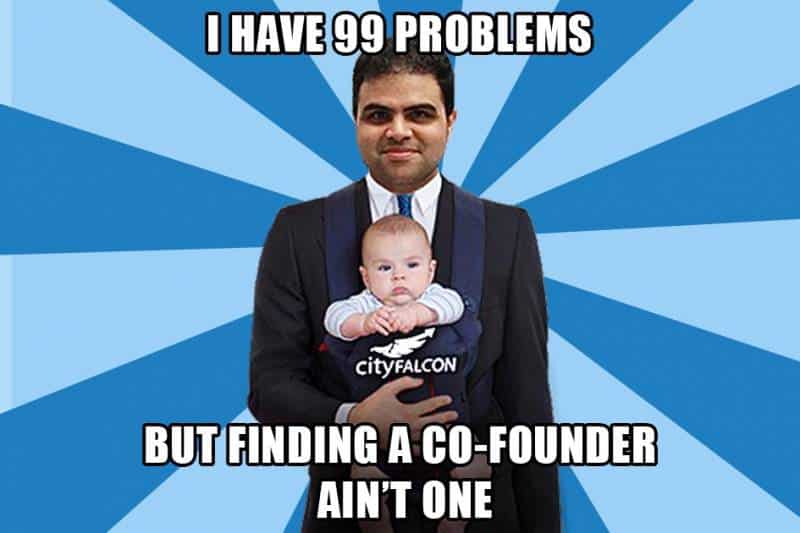Imagine someone going to a woman and saying – “You will fail because you’re a woman…how many women do you see in the boards of big companies?… clearly the stats prove that you’ll fail if you’re a woman”. If you don’t realise the issue here, please go back to work because you won’t understand what I’m talking about: the self-fulfilling prophecy. Some women do not “succeed” because of the discrimination they face at work and even at home, because people don’t want them to succeed or don’t want to help women succeed. The gender discrimination issue is far more complex but you get the point. Now just replace ‘women’ with ‘single founder’ in the example.
While women and colored people are allowed to apply to accelerators and investors, single founders are discriminated against much more openly; see the answer from FAQ about single founder at Oxygen Accelerator. Before you start with ‘but this is different’, read the section ‘frequently mentioned annoying statements to single founders’ below.
Most stats would put failure because of a single founder and because of issues between co-founders at the same level. Given that the ecosystem outright doesn’t want to support single founders, I think businesses with single founders might actually perform better than those with co-founders if they were to get the same level of support.
Luckily at CityFALCON (which I started built out from my bedroom almost 3 years back), we have gone past the stage where people annoyingly keep reminding you about how you’ll fail because you’re a single founder. The focus has now thankfully shifted to the team and product that we’ve built. As a sole founder with a strong team, we’ve raised £600K funding, built web, iOS and Android apps, launched an enterprise level API for businesses, graduated from Microsoft Ventures Accelerator, and we are currently a part of Octopus Labs Accelerator. Of course I’ve been very lucky with the support of my friends, ex-colleagues and real ‘angel’ investors who helped us to reach this stage.
Other parallels that you can find to the situation of a single founder
- You’re 30 and single, something must be wrong with you, when will you settle down, it’s time for you to have a family, etc.
- Poor single parent…how are they going to raise the kid.
- First time entrepreneurs get less support and investment than serial entrepreneurs which of course also helps serial entrepreneurs outperform single founders
The general annoying view about sole founders
Paul Graham – “What’s wrong with having one founder? To start with, it’s a vote of no confidence. It probably means the founder couldn’t talk any of his friends into starting the company with him. That’s pretty alarming, because his friends are the ones who know him best.”
“But even if the founder’s friends were all wrong and the company is a good bet, he’s still at a disadvantage. Starting a startup is too hard for one person. Even if you could do all the work yourself, you need colleagues to brainstorm with, to talk you out of stupid decisions, and to cheer you up when things go wrong.”
Sorry Paul, but you sound like one of my overly-critical aunties from back home in India 🙂
Why go solo?
- Your personality – you’re a type A, a go-getter, and want full control on everything being done for your start-up.
- ONE leader, ONE vision, strong team.
- You understand your strengths and weaknesses, and decide to add missing skills to your repertoire. I knew that as a finance person, I’d struggle to build a FinTech company if I didn’t understand technology, and so I spent 6 months learning how to code and built the first version of CityFALCON with the support of the online tech community that helped out every time I was stuck. Thank you Makers Academy and StackOverflow!
- You have an idea, can’t find your start-up soulmate, and so decide to get going instead of waiting and then giving up like so many people we see today.
- With more than one founder, there is a higher potential for founders’ disagreements and conflicts.
- In several founding teams, at most times there is really 1 founder who is the most passionate about solving the problem, and didn’t really need other founders in the first place.
The start-up fairy tale, and why it’s the start-up ecosystem that requires the biggest disruption
As an entrepreneur, you want to disrupt, innovate and even conquer the world but the start-up ecosystem is still run especially in Europe by most who have never built a business from scratch. So for most investors, advisors, and government officials, they read books, use templates, and most have been told how successful companies are built – the start-up fairy tale: you have an idea, you find a technical co-founder, you raise seed money from angels, get ready for Series A, keep raising money until you exit or you go burst. If you decide to think outside of this fairy tale, unfortunately you won’t have many supporters. Some VCs have not given us money because we want to break even first instead of throwing money at advertising and growing at any cost like you see with some of the unicorns.
YCombinator broke one of its rules to accept Dropbox who had a single founder
Paul Graham says “Drew’s case shows how hard it is to generalize. We’re generally reluctant to fund single founders. And yet the most successful startup we’ve funded had a single founder at the time he applied.”
“We strongly encouraged Drew to get a cofounder, and he found Arash before the summer 2007 cycle began. Arash turned out to be the perfect cofounder. So Dropbox is pretty much the best case scenario for a single founder applying to YC. And the variation in startup outcomes is so great that even though we have such a large data set, the best single founder outcome is so far better than any of the multiple founder outcomes.
This is why one of our rules is that we’ll break any of our rules.”
Frequently mentioned annoying statements to single founders
- “Successful companies are built by teams (of founders)” – yes, sure, but why does it have to be a co-founder, and not a single founder who has built a strong team?
- “You need someone to bounce ideas and challenge you” – yes, we’ve built a open culture within our team where we challenge each other, debate and conclude; we don’t need a co-founder for that. Also you can build a strong support network of mentors and advisors who you can bounce ideas off and get introductions, etc.
- “marketing, product, sales is not working, I think you need a co-founder”, ;
- “What happens to the business if you come under a bus” – This is a genuine risk to you making 5-10x your money but success planning, and keyman insurance can mitigate the risk. If I’m alive or not disabled, I’ll work hard to provide return to my investors!
- “Running a company as a single founder will be very demanding” – Of course, we, single founders know that but I personally love it! I’m not working 15 hours a day, I’m raising my child, and there is nothing more rewarding as most parents would agree.
Examples of discrimination by investors, accelerators, etc.
- YCombinator generally doesn’t accept single founders. It seems that even if they do in exceptional cases, they want entrepreneurs to find co-founders.
- WSJ- “Y Combinator partner Jessica Livingston, who estimates that fewer than 10% of companies accepted and funded by the accelerator are led by solo founders.”
- Techstars blog – “…So, Techstars will not “rule out” single founder companies from consideration. However, I do believe that there is a general bias among investors that startups are too hard for just one person, and that one person isn’t likely to be excellent at technology, sales, marketing, and running a business… So single founders – don’t be shy! Apply! Just know you’re probably at somewhat of a disadvantage. You can see our attitude towards this in that we’re providing seed funding based on the number of founders. There is probably some merit in the old saying two (or three) heads are better than one…”
Some places where single founder is not an issue
- Lean Investments – “Team – Honest, hardworking, fast-moving people. One founder good, two founders better (but not always). Rarely four. Love scholars and dyslexics. Growth, not fixed, mindset. People who want to hire others smarter than themselves.”
- Forward Partners – “..We already well on the way to proving this. At Forward Partners we have already backed 10 companies when there was just a solo founder; They received their first equity funding from us pre-product and as solo founders. We’re happy with the progress to date. All have since gone on to build products and teams. We’re now looking for ways to regularly repeat. To summarise, we believe that at the heart at every company is a great entrepreneur. We also agree that forming a great team is essential. With our help, a solo founder has the chance to first validate the business model before forming the team. There are investors prepared to invest pre-product with solo founders – and right now, we’re one of them.”
Some examples of successful companies with single founders include:
- Tumblr (Acquired in 2013 by Yahoo for ~ £856m);
- Plenty of Fish (Acquired in 2015 by Match.com for ~ £519m);
- Vitrue (Acquired in 2012 by Oracle Corporation for £191m);
- SinglePlatform (Acquired in 2012 by ConstantContact for ~ £80m);
- Dropbox (was initially founded by Drew Houston who invited Arash Ferdowsi upon demand from Y Combinator);
- FireEye (Went Public in 2013, market cap of $2.7bn);
- ServiceNow (Went Public in 2012, market cap of $11.58bn)
Recommended Reads:
- Rebekah Campbell: Sole Founder vs. Co-Founders
- How Learning to Code Helped on my Entrepreneurial Journey (CityFALCON Blog)
- The Single Founder Dilemma
- Startup Dirty Laundry: Conflicts That Kill Partnerships
- Entrepreneurs, Listen Up: You Don’t Need A Co-Founder Anymore
- The Case for the Single Founder Startup
- Paul Graham, Dropbox And The Single Founder Exception
- How Solo Founders Beat The Odds and Get Into Top Accelerators
- The solo founder hypothesis
- Amazon Startup Story
Conclusion:
Stop following rules and templates, start thinking with an open mind, innovate and back innovation. Happy disrupting! 🙂





13/01/2017 at 8:13 pm
great website, keep sharing such a great content
Thanks
04/06/2017 at 12:26 pm
Nice 1
Really like this article appreciated work Bro keep continue
Thanks,
25/04/2018 at 7:21 pm
Jeff Bezos is also a solo founder 🙂